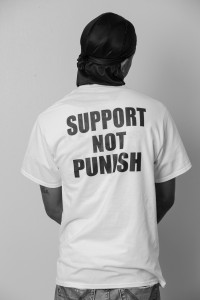
Two summers ago, a team of Bronx youth who are actively engaged with community-led efforts to keep youth free from incarceration, launched an inquiry into the experience of young people in the juvenile justice system. Our team was comprised of Bronx youth under the age of 25, all of whom have either experienced the juvenile justice system personally, or have family members and close friends who have been locked up.
Unlike traditional research in which people from outside of our community study us, we used Participatory Action Research (PAR), a methodology that mobilizes individuals who are directly impacted by a problem to study issues of concern to us, and to generate solutions using collective inquiry with our peers. We called it REALsearch to emphasize that the people conducting the research have real life experiences with the system, and are proposing real solutions.
We surveyed almost 100 Bronx youth who had experienced the juvenile justice system. Some of our most startling findings are as follows:
- Only 42% of youth had their parents immediately notified after arrest
- Only 28% of youth had their parents present when questioned by the police
- 45% of youth said the programs they were sent to were not helpful
- 74% of youth coming back to the community from residential placement said they had no support in their transition home
These findings didn’t surprise us, as many of us have personally experienced mistreatment at the hands of the police and the systems that are supposed to help us. We know that this is an issue that affects almost exclusively youth of color, as Black and Latino youth make up 98% of young people in the Bronx juvenile justice system. We wanted to highlight the ways that the system is failing us to educate the public and to hold system stakeholders accountable for the way youth are processed through the juvenile justice system. A system that spends well over a quarter million dollars per year to lock up just one young person should have better outcomes.
We didn’t only highlight the failures of the system. We asked young people how they wanted to be involved in making change. Sixty-three percent of youth said they would like to be supported by other young people who had experienced the system. Seventy percent of youth said they would like to be considered in policy discussions about juvenile justice reform. Young people offered solutions such as scheduling court dates to avoid conflicts with school, and providing peer mentors for youth to help them navigate the juvenile justice system – especially peers who themselves have been through the same experience.

In order to communicate our message to a broader audience, we produced a report called “Support Not Punish: Participatory Action Research Report.” To get the message to the community, we printed T-Shirts featuring the report’s findings, and arranged a photo shoot of young people wearing the shirts. We unveiled the exhibit and released the report on Wednesday, February 24th at the Bronx Art Space, located at 305 E. 140th Street in the Mott Haven neighborhood of the Bronx. We also facilitated a dialogue with juvenile justice system stakeholders who have the power to make changes to the way the system currently functions.
New York’s juvenile justice system leaders are listening to us. Gladys Carrión, Commissioner of the NYC Administration for Children’s Services (ACS), which oversees detention and placement facilities for juveniles in New York City, acknowledged the need for a change in approach. “For too long, our communities and children have been seen as the problem,” said Commissioner Carrión. “However these families and communities are assets that we need to support and embrace to achieve better outcomes for children.” Ana Bermúdez, Commissioner of the NYC Department of Probation agreed: “We welcome input from the young people that we serve, and from their families,” said Commissioner Bermúdez. “While we have come a long way, learning directly from our young people will help us continue to refine our practices, offer more targeted and appropriate supports, and thus improve outcomes for these ‘at-promise’ youth.” Both agencies pledged to work to improve youth voice in the development of policies and programs for young people. We look forward to working with both agencies in youth-driven recommendations, but our ultimate goal is still the eradication of these oppressive institutions that have done so much harm in Black and Brown communities.
We often hear adults perpetuate a false narrative about young people in the justice system, saying that we just don’t care. Nothing could be further from the truth. We want to participate in making effective changes for our communities. Failure to engage us in these discussions in meaningful ways will only produce more failed attempts to reform a broken juvenile justice system. The systems are failing, but youth have the answers.
DeVanté Lewis, an active member of United Playaz of New York, lives in the Bronx and works as an artist for social change and development. He is a co-author of the Support Not Punish Report.




